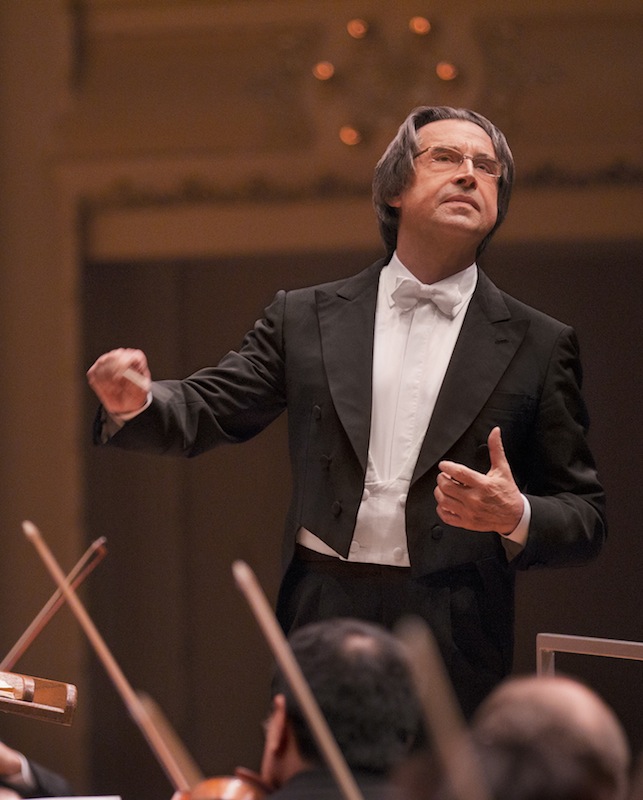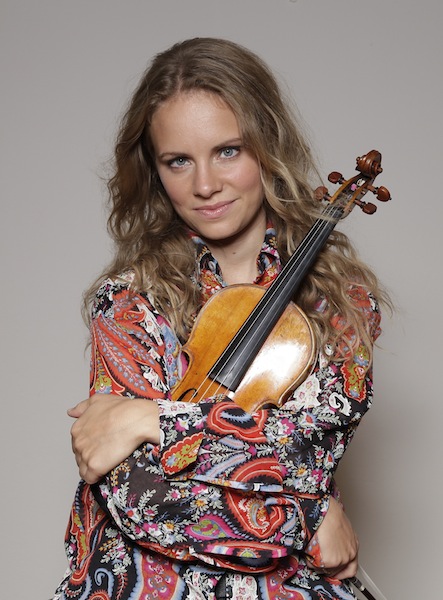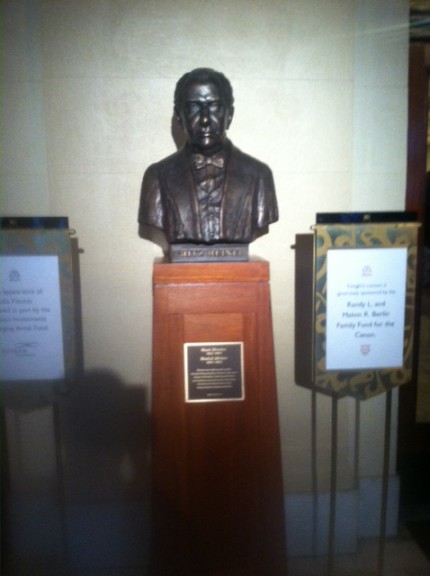A somber tribute, then Beethoven and Brahms from Muti, CSO

It’s a sign of the times that Riccardo Muti’s weeks in Chicago often seem to coincide with yet another violent tragedy.
The Chicago Symphony Orchestra music director opened the final two weeks of the ensemble’s season Thursday night with spoken remarks about last weekend’s massacre in Orlando. Muti said the music on the evening’s program offered “works of beauty, serenity and love—exactly what we need in the world today.” The conductor asked the audience to stand for a minute of silence and dedicated this week’s performances to the memory of the Orlando victims.
The last downtown CSO performance of the Beethoven Violin Concerto was the famous 2010 gala concert of Muti’s inaugural season as music director when the ailing conductor had to bow out minutes before the curtain. Anne-Sophie Mutter did admirable double duty conducting the orchestra as well as performing the concerto.
Another gifted German woman was in the spotlight Thursday night with Julia Fischer as soloist.
Fischer’s performance had much to recommend it: an attractive silvery tone, impassioned cadenzas, and a highly polished technique, apart from a few fitful phrase endings turning south.
Yet Thursday’s performance proved curiously uneven. The violinist’s slender sonority and small-scaled approach underplayed the drama of the opening movement. Apart from the cadenzas, there was a stark lack of intensity with soft-edged attacks and a relaxed intimacy prevailing. Fischer’s violin tone always fell gratefully on the ear yet her Mozartian timbre and style felt a size too small for Beethoven’s music.
She brought glowing sensitivity to the Larghetto and the Rondo finale went best, with Fischer more relaxed, and her lightly bowed touch delivering the buoyant elan of the finale.
With Muti firmly directing the proceedings with fiery tuttis, the stylistic disparity felt even more stark. The conductor often seemed more focused on illuminating piquant scoring details than collaborating cohesively with his soloist. Rarely has this music sounded more like a symphony with obbligato violin.
The audience clearly felt differently about Fischer’s performance, repeatedly recalling the violinist to the stage with rousing ovations. She responded with an encore of the Sarabande from Bach’s Partita in D minor. Played with simple sensitivity, Fischer’s expressive rendering offered the most moving and eloquent tribute of the evening to the Orlando victims.
Muti is doing a complete cycle of Brahms symphonies next season, so this week’s performance of the composer’s early Serenade No. 1 made an apt precursor.
The Serenade marked a toe-dipping in orchestral waters for Brahms, affording an opportunity to tackle large forces without the pressure of writing a symphony. Brahms’ symphonies to come are more substantial than the Serenade but there is a freshness and beguiling charm in this quirky, six-movement work only infrequently glimpsed in his later, greater works.
Muti made a fine recording of Brahms’ Serenade with the La Scala Philharmonic Orchestra in 1993. In the early going Thursday, one wanted more of the vernal freshness and outdoor atmosphere evinced on that Sony disc. While well played, the CSO music director was in his over-controlled, tautly aggressive mode, with a knife-edged focus on dynamics and tempo shifts that shorted the relaxed charm and melodic appeal of the music.
Muti loosened his iron grip as the performance unfolded and the latter movements were more successful. While he took a cool, quickish approach that skirted the emotional depth of the Adagio, the performance brought out the Handelian swagger of the second Scherzo and the finale provided a worthy payoff, thrown off with bumptious energy.
The CSO was in characteristic top form throughout for their music director. Daniel Gingrich delivered stellar contributions in the prominent first horn role and Stephen Williamson’s clarinet work lent colorful rusticity.
Frank Rosenwein is playing principal oboe at this week’s concerts. Principal of the Cleveland Orchestra, Rosenwein had fewer opportunities to shine in this program than in his terrific debut as a sub with the CSO in February. Yet once again he played with superb character and blended immaculately with his colleagues.
Coming a week after principal oboe auditions, it’s quite possible that these concerts mark Rosenwein’s audition for the chair with Muti. The orchestra can do no better in this crucial position, and one can only hope that the Chicago native returns to take up the CSO principal chair.
___________
Earlier this week a new bust of Fritz Reiner, commissioned for this 125th anniversary season, was unveiled in the outer lobby of Orchestra Hall. Created by sculptor Katalin Gerὄ, it marks the historic legacy of the Hungarian conductor, who served as CSO music director from 1953–1962 and whose RCA recordings remain touchstones in the CSO discography.
The program will be repeated 1:30 p.m. Friday, 8 p.m. Saturday and 7:30 p.m. Tuesday. cso.org; 312-294-3000.
Posted in Performances



Posted Jun 18, 2016 at 5:19 pm by Paul
Ever since the beginning of Muti’s tenure, has there ever been a mediocre review of a CSO performance under our Maestro’s baton? I’d be hard-pressed to find one.
I disagree with your assessment of Fisher’s interpretation. If anything, the uninspired performance of the orchestra in both the Beethoven and the Brahms I believe saddled Miss Fisher
I just can’t put my finger on it. Muti’s interpretations are sometimes revelatory, yet the orchestra under Muti is beginning to sound uninspired and tired.
Posted Jun 21, 2016 at 11:51 pm by Anne-Marie
I’ve just come from the last performance of this week’s repertoire and beg to differ from the preceding comment. Miss Fischer’s performance of the Beethoven, as well as the orchestra’s of both the Beethoven and Brahms pieces struck me as very artistically satisfying. The rapport between the maestro and the musicians was definitely charged and far from tired and uninspired. I left the hall exhilarated, not lulled to sleep!